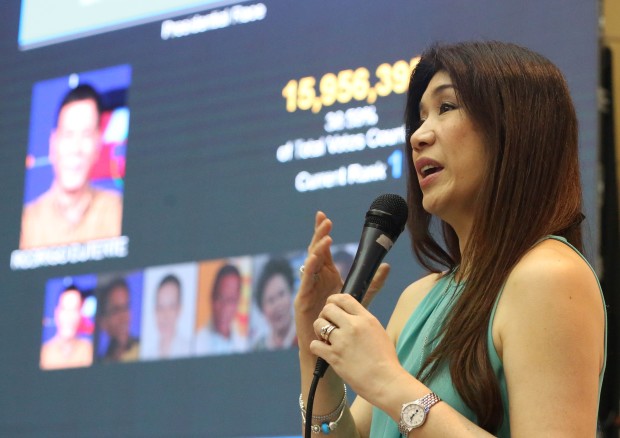No cheating, PPCRV insists

PPCRV Communications Director Ana De Villa-Singson releases the results of its initial irregularity tests in the automated election on Saturday, May 14, following the issue on alteration made to the transparency server script, which resulted in changes in the hash code. MARIANNE BERMUDEZ
The poll watchdog Parish Pastoral Council for Responsible Voting (PPCRV) on Saturday said its audit tests had detected no irregularities so far in the election results transmitted to it, although critics continued to question the results of the tight race for the vice presidency.
“We ran several tests, and I am happy to report that there is not a single anomaly found in the tests that we’ve had so far,” Ana de Villa Singson, PPCRV media and communications director, said at a press briefing.
The transparency server that receives the results transmitted from the vote-counting machines is housed at the PPCRV command center at Pope Pius XII Catholic Center on United Nations Avenue in Manila and the group has access to the data.
The PPCRV has been conducting irregularity tests on the server data since the Philippines began holding automated elections in 2010, but it usually releases the results a month or so after the polls, Singson said.
This time, however, the PPCRV decided to release the results of its initial irregularity tests early because of the controversy generated by an alteration made to the transparency server script, which resulted in changes in the hash code.
Officials said the alteration resulted only in a “cosmetic” change—the correction of the spelling of a candidate’s name—but critics continue to raise concerns about the integrity of the results, with the camp of Sen. Ferdinand “Bongbong” Marcos, who is trailing Camarines Sur Rep. Leni Robredo in the vice presidential race, demanding a public audit of the computer systems of the Commission on Elections (Comelec) and its technology partner Smartmatic.
READ: Comelec says ‘cosmetic’ change in script unnecessary / Ex-Comelec exec: ‘Cosmetic’ changes raised questions
“We hope truly that the hash code issue is not used or overblown to undermine the credibility of an election [that] otherwise seems to be credible as of the date of our study,” Singson said.
The PPCRV started the irregularity tests on data received as of Thursday, after 95.85 percent of clustered precincts had transmitted results.
The PPCRV tested for precincts with multiple transmissions of results, Singson said.
She said there were four clustered precincts—one in Parañaque and three in Basilan—where the election returns were placed under observation or investigation. This was likely due to the same machine sending two sets of mismatched data, she said.
Singson said, however, that there was no irregularity.
READ: No anomaly in transparency server – PPCRV
She explained that the election returns in the four precincts could have been placed under observation because the system did not know which of the two sets of data to read for the precincts.
Singson said this could happen if the election inspectors mistakenly sent the results of the vote testing conducted on the machines before the elections, as well as the election results.
She also said that there were no precincts that transmitted results before the close of the polls at 5 p.m. on Election Day.
There were also no precincts that reflected exactly 10 votes for Vice President, which would have indicated that the results of the final testing and sealing of the machines were the ones transmitted instead of the results of the actual voting, she said.
The PPCRV also did not find return precincts where the undervote or overvote is greater than the number of voters using a particular position, she said.
There were also no return precincts where the undervote or overvote is greater than 95 percent of voters using a particular position, she said.
Singson also said the 2016 elections had the fastest transmission of results since the country began holding automated elections in 2010.
In that year, the transmission reached 70 percent eight and a half hours after the polls closed, and in 2013 70 percent transmission was reached 22 hours after the elections ended, Singson said.
But this year, 70 percent transmission was achieved four hours after the polls closed, she said.
In 2010, she said, 90 percent transmission was reached after 30 hours. But this year, there was 90 percent transmission 14 hours after the balloting.
The voter turnout was also unprecedented, Singson said. The Comelec recorded an 81 percent voter turnout in the country, and 37 percent for overseas absentee voting. TVJ
RELATED STORIES
PPCRV says 1.4M votes still to be transmitted
Smartmatic’s defense: Comelec knew about tweak in script
RELATED VIDEOS














